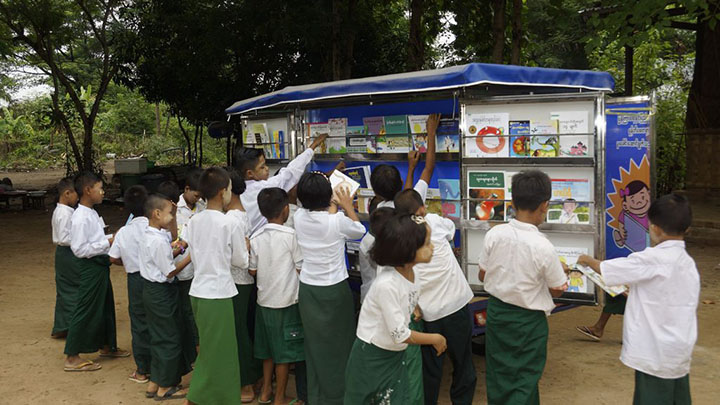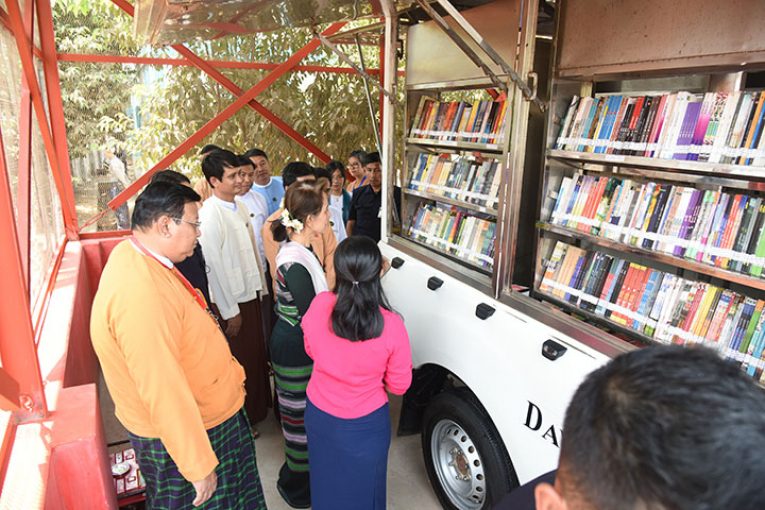(1)
I was pleased to read a news report on the opening of 31 mobile libraries in Pyapon Township, Ayeyawady Region, which appeared in the 22-6-2019 issue of the Mirror Daily. According to the news report, the libraries were opened by the Saya Zawgyi Centenary Library. The Libraries were opened at basic educations in the township on 7 June, with the goal of enabling students who were difficult to reach a library to have their own reading corners. I was glad to know that those schools included monastic education schools, nunneries and Pyapon prison, apart from government schools.
Each library has 100 books of various categories for children. Every month, library executive committee members and volunteer youths exchanged books between the libraries. I felt respect for them for their effective program. So I started to ponder the libraries, thinking, “How good it would be if we could extend the reach of mobile libraries even to rural and border areas and hill regions.”
(2)
It will be correct, if we say that travelling public educative libraries are the source of mobile libraries. During the administration of the parliamentary government, the Mass Education Council was formed in 1949, and the Council carried out its tasks for 10 years till 1958. The Council opened reading rooms by building public centres and libraries in rural areas all around the country to broaden the scope of knowledge of the villagers and public health centres to provide medical treatment, and conducted Three Rs courses and vocational education courses. The Council sent Public Education Vehicles, each carrying a corner for mobile library, a clinic, a radio and a projector to disseminate knowledge in the rural areas. It was a significant activity. The Council also distributed public educative pamphlets in towns and villages in various parts of the country. During the decade the mobile libraries visited villages in disseminating knowledge and education. In my view the drive had changed the thoughts and views of the people and developed their health, education and socio-economy to a certain level.

(3)
The education system of the country started to deteriorate in 1962. The scope of public knowledge narrowed alongside the waning role of libraries. On account of the lack of knowledge and rational thinking of the persons leading the country, Myanmar fell down into the list of world’s poorest nations. In 2015, the National League for Democracy led by Daw Aung San Suu Kyi won the decisive victory in the elections thanks to the unanimous support of the entire public. It has been four years since the State Counsellor is endeavouring to raise many sectors of the country including education, health and economic fields. Currently, the education sector is being developed through long-term and short-term projects. We can see continuous efforts in providing youths with the vocational education and broadening their visions through the establishment of the Daw Khin Kyi Foundation. In the remote areas even the periodicals were very rare, let alone a library. As those areas are far from books, their residents lack knowledge. Daw Khin Kyi Foundation visits the schools that are far away from towns, with mobile libraries, and hire books that give aesthetic value, education or information, and journals, magazines and cartoons. It is so pleasant to see the joys on the faces of students who are reading books at the library. In my view, schools which have no library should be prioritized in hiring books with the help of mobile libraries. It is true that students and youths will have higher intellectual level if they can read books that give them various branches of knowledge and aesthetic enjoyment.
(4)
It is encouraging to see that the country has young volunteers like Ko Zaw Zaw, who set up a library on self-reliant basis, and hires books free of charge. He is the winner of the award conferred on him by the State Counsellor. Although he is weak in school education his degree of philanthropic spirit is high. Ko Zaw Zaw is a person who runs the free library by his own money. He buys books, keeps them and encourages children of the nearby places to read books. He also rides a bicycle in providing door-to-door free book hiring services for people who cannot come to the library. He ceaselessly rotates the books among the readers. This indicates the degree of goodwill and perseverance he has placed on his job. Frankly speaking, it is a job even people, with authoritative power, cannot do. I honour his public spirit and persuasion. He is an example for other young people.
In fact, a library is a knowledge bank where a trove subjects including arts, science, aesthetic literature, educational literature, books on sports and informative literature can be found. We need collective efforts for the robust development of libraries in Myanmar. Harmonious participation of the Myanmar Library Foundation, Daw Khin Kyi Foundation, Union ministries, library associations and the entire public is important for the spread of active mobile libraries both in rural and urban areas. People will have better ideas and visions if their intellectual power and knowledge can be improved through increasing the number and activities of mobile libraries. Higher public intellectual level means lower rate of crime, corruption and violence in a community.
(Translation: TMT)


